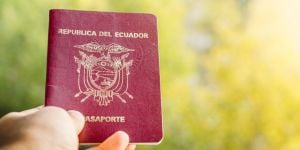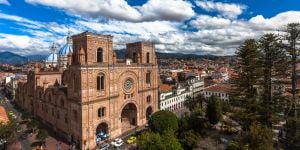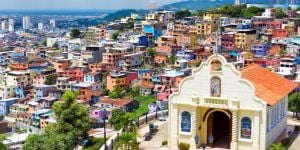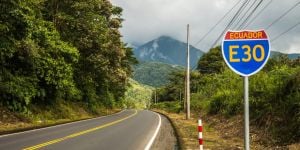Cost of living 2019 in Ecuador
Hello everyone,
As we usually do each year, we invite you to share your experiences and tell us more about the average prices of products and services in your town/city/area, so that we have updated information regarding cost of living and inflation in Ecuador.
Thanks to your contribution, future expats in Ecuador will be more informed and will be able to refine their budget and better prepare for their big move.
How much does it cost to rent an apartment or a house in Ecuador? How about buying an apartment or a house in Ecuador?
How much do you pay on average for public transportation (bus, subway, train, tram, taxi)?
How much do you pay for basic food items such as rice, bread, and pasta?
What is your monthly budget for groceries?
How much does it cost to see a doctor or health specialist in Ecuador?
How much do you pay for health insurance per month?
How much does childcare cost on average per month?
What is your child's schooling budget per month?
How much does it cost to fill up your cars fuel tank?
How much do you pay for electricity/gas/water etc., per month?
How much do you pay for your internet and phone subscription?
How much do you pay for your lunch pack on weekdays?
How much do you pay for an espresso coffee?
How much do you pay for a cinema ticket?
How much does a gym membership cost in Ecuador?
Thank you for sharing your experience.
Priscilla
- The Working Holiday Visa for Ecuador - Guide
- Cost of living in Ecuador in 2026 - 5 Replies
- Cost of living in Ecuador in 2025 - 5 Replies
- Cost of living in Ecuador in 2024 - 2 Replies
- Cost of living in Ecuador in 2022 - 15 Replies
- Cost of Living in Ecuador in 2020 - 19 Replies
- Cost of living 2018 in Ecuador - 47 Replies
- For Malacatos/Loja -
Property Tax: ~0.1% of assessed value (assessed at $50k = tax of $50) (no change)
Vehicle Registration/Tax: ~$250 / year (complicated. depends on engine size, vehicle age, etc.) (no change)
Public transportation: Taxi $2-2.50 / 10 minute ride. Bus ~$1-1.25 / hour, $0.30 inside city (no change)
Foods:
Rice: $1 / kg
Pasta: $18 / 20 kg
Flour: $6-7 / 10 kg
Butter: $7 / kg
Sugar: $1 / kg
Milk: $1 / L
Ground beef: $3 / kg
Eggs: $1.80 / Doz
Onions: $1 / 3-4 lbs
Tomatoes: $1 / 3-4 lbs
Potatoes: $1 / 3-5 lbs
Pineapple: $0.75 ea
Monthly budget for groceries: $50-75 per person. (no change)
Gasoline: $1.85 / gallon (Much more expensive this year. Was $1.48 a gallon - a 25% increase.)
Electricity: $20-40 / month (no change)
Propane: $2.50-5.00 / month - $2.50 / cylinder (no change)
Potable Water: ~$4 / month (no change)
Irrigation Water: $45 / year (Much more expensive - was $20 in 2017)
Internet: $470 / year (no change)
Phone (prepaid and IP): $30/year (no change)
Restaurant Lunch (Almuerzo): $2.25-2.50 (no change)
Coffee (Restaurant): $0.75 (no change)
While I have not collected detailed information it seems in the 2+ years I have lived here the cost of things has increased dramatically. Of course I live in the center of Quito in one of the most popular areas. Some examples are: a new one bedroom condo in a high-rise, now being built, is an eye popping $486,000 (You read that right. Those are Austin Texas prices I moved away from.); also I just glanced at a pair of sweatpants at MegaMaxi and they were nothing special for $38.00. To me, those prices seem a bit extreme for Ecuador. You can absolutely find better prices, but I am hoping that is not a sign of the times. Same thing happened in Austin where I had originally planned to retire.
Easy now.
Yes, a fancy apartment in a sofisticado vecindario with pool, 24-7 vigilante and guardería will set back the jet set hundreds of thousands in the capital, especially if you pay full price at the estreno phase. New arrivals shouldn't be eyeing these.
Instead of buying designer sweat pants -- or any sweat pants -- at Megamaxi, try non-mall local stores and remate mercados on Benalcázar. You'll save a bundle.
You can budget high or low in Quito. Up to you. 
cccmedia
How much does it cost to rent an apartment or a house in Ecuador?
$1200, 3 bedroom house with wooden floors in middle/upper middle class neighborhood.
How much do you pay on average for public transportation (bus, subway, train, tram, taxi)?
Taxi, 2.5 kilometers is about $4. Central areas in Quito to airport is $25.
How much do you pay for basic food items such as rice, bread, and pasta?
Pasta $2.50 500 grams (Italian brand), rice about $3 for 2 kilograms. Bread varies a lot, pita bread 8 pieces is $2.50.
What is your monthly budget for groceries?
$300 more or less.
How much do you pay for your lunch pack on weekdays?
Varies from $3.50 to $20. Proper arroz marinero (seafood fried rice) with a carbonated water is about $13.
How much do you pay for an espresso coffee?
$2
How much do you pay for a cinema ticket?
$4-$8
How much does a gym membership cost in Ecuador?
$80
JadeRiver wrote:While I have not collected detailed information it seems in the 2+ years I have lived here the cost of things has increased dramatically. Of course I live in the center of Quito in one of the most popular areas. Some examples are: a new one bedroom condo in a high-rise, now being built, is an eye popping $486,000 (You read that right. Those are Austin Texas prices I moved away from.); also I just glanced at a pair of sweatpants at MegaMaxi and they were nothing special for $38.00. To me, those prices seem a bit extreme for Ecuador. You can absolutely find better prices, but I am hoping that is not a sign of the times. Same thing happened in Austin where I had originally planned to retire.
It's going to be an interesting year. They raised gasoline prices across the board, it was super first, now it's regular gas. They recently doubled the environmental tax for older cars.
A friend is fuming over that because the increase alone for his wife's car will be more than the basic salary. Hopefully, they counter the increases by further reducing costs elsewhere like reducing import taxes on imported cars.
Quality clothing is crazy expensive here with the exception of places like Zara during big sales. A decent dress shirt during sales can be bought for $30 (usual price is $50). I buy from them because I like their sizes (European).
Other stuff, like shoes, quality rain gear, sunglasses, I always buy abroad.
Yeah, the cheap clothing here is either fake, or is cheaply made.
Members who read this thread including previous cost of living year threads know I sometimes mention numbeo as the prices there pretty much reflect the reality in Quito. Looking at that site tonight, this comment caught my attention:
U S prices living in Quito a 3rd world country, never me
It probably seems like an exaggeration, but for people who live in Quito, it’s actually not. It’s true that Quito does not price anyone out but the reality is many things here are US/Europe/developed world prices. A nice house will cost hundreds of thousands in good areas. Car prices cost 50% and more.
Sure, one can say hey it’s cheap when all they eat is almuerzo. But, what about when one wants to buy a new car or new SUV or buy a new apartment or house in middle class/upper middle class neighborhoods?
For expats who are full of themselves or who think they set the market. The market is not set by them. The market for desirable properties is set by local affluent Ecuadorians and the million or so Ecuadorians who are abroad. The Ecuadorian Americans, the Ecuadorian Europeans.
They are the ones buying most of land and properties in the desirable areas whether it’s the coast or the valley of Quito.
Cost of living February 2019 (Quito)
Kellogg’s Musli, 300 grams $4.05
Almond milk (Nature’s Heart 946 ml) $3.49
DHoy orange/carrot juice with pulp 1.75 liter $5.69
2 oranges from the coast $0.40
Organic scallions 320g, $0.89
Blueberries 125g, $3.25
2 medium Haas avocados $1.49
vsimple wrote:Members who read this thread including previous cost of living year threads know I sometimes mention numbeo as the prices there pretty much reflect the reality in Quito. Looking at that site tonight, this comment caught my attention:
It probably seems like an exaggeration, but for people who live in Quito, it’s actually not. It’s true that Quito does not price anyone out but the reality is many things here are US/Europe/developed world prices. A nice house will cost hundreds of thousands in good areas. Car prices cost 50% and more.
Sure, one can say hey it’s cheap when all they eat is almuerzo. But, what about when one wants to buy a new car or new SUV or buy a new apartment or house in middle class/upper middle class neighborhoods?
.
It's location, location, location. Even if you are comparing all homes that are approximately the same size (say 145-155 square meters), the same age (built in the last 20 years), the number of rooms and baths (3 beds, 2 baths)... you'll get a wide variation in price, just in a single city. And the answer why is always Location.
I suppose people read The Headlines in retirement magazines about costs of living is 50% less in Ecuador. And some people (ridiculously) believe this applies to everything. A new 2019 Porsche 718 Boxter for $40,000! Hahahahaha. No, no.
Living in a 5-star neighborhood always carries a hefty price tag, no matter where you go in the world.
And $900 per month fixed income won't get you 5-star living. But it might get you 3-star in Ecuador, which is much better than some other places around the world for the same tight budget.
lebowski888 wrote:And $900 per month fixed income won't get you 5-star living. But it might get you 3-star in Ecuador, which is much better than some other places around the world for the same tight budget.
More like 2-star level in Quito and in not so good neighborhood. A member posted such info on the Spanish language version of this website. Or basically rent as $300, food $150, insurance $110, etc, etc.
That is relatively 2-star.
3-star would probably include a used car and the yearly expenses are matrícula, municipal revision, maintenance, gas, insurance, satellite tracking in event it’s stolen (as many a 5 cars are stolen every day in zona 8 Guayas).
4-star would probably include a new vehicle and costs can easily cost $300+ a month for the previously stated expenses. This is of course if there are no car payments, and if there are then it's at least $300+ more.
Alright lets talk inflation. So far this year things are looking good. The INEC or the National Institute of Statistics and Census released inflation numbers for 9 cities in Ecuador. The annual inflation number stood at 0.16 percent while February inflation was -0.23%, yes that’s a negative sign preceding the zero. Source: El Comercio Newspaper
So, you may think we’ll how does this affect me?
It’s very simple, an inflation number of 0 basically means that prices are generally the same compared to a previous comparable period. The inflation numbers released more or less indicate that prices this year are basically the same as last year. In conclusion, these inflation are a good foretelling for this year and goods news for residents in Ecuador.
Okay, now a cost saving tip. Remember to get your supermarket cards, the savings are significant for many items. Also, it’s worth stockpiling items that are sold 3 for 2. Case in point - shampoos, soaps, deodorant. That’s how I go about it, so even if I know I don’t need a particularly item for the next month or so. I buy it, if it’s sold 3x2.
The following vegetables are all organic. So, those interested in organic produce will have a good idea of prices.
Quito, March 2018
Carrots 350 grams $1.70
Spinach 250g $1.25
Tomatoes 1.275 kilogram $3.52
Kale 85g $1.69
Zucchini 325g $0.75
French beans 350g $1.89
What I like about the organic produce industry is that it is growing nicely. The variety is much more now. The distribution is also better as one can easily find the items I listed above in big supermarkets like supermaxi and megamaxi. I think in time we will have every kind of vegetable in organic form and with brands to compete.
The carrots I bought for $1.70 are clean and ready to eat. They’re also in a zip-lock package which makes everything easier including preservation
Cost of living April 2019, Quito
Salmon fillet, $22.65 kilogram, the fillets in bags, absolutely delicious and well preserved, try the garlic honey recipe. (Supermaxi)
1 whole chicken 1.5 kilogram, $6
Tilapia fillet 454 grams (1lb) $6.29
Fresh orange juice 500 ml, $1.45
Organic tomatoes 1kg $2.59
Organic spring onions 150gm $1.49
Kale 85gm $.179
Corona beer 6-pack 3x2 (3 6-packs for the price of 2) $26.67
Sweet & Coffee, 400gm (ground coffee) $5.89
Gas (92 octane) $2.79 gallon
Salad bowl, Freshii, $7.25
Salad Bowl, Go Green, $8.95
500 A4 Paper, $4 on sale (juan marcet)
Comforter cleaning $6 (local lavandaría)
Bed sheet cleaning $3
Dry clean dress shirt $3
Dinner (2 ppl) neighborhood Chinese restaurant $30, 2 main dishes, 1 side dish, 3 beers
I agree. I imagine living in Quito is expensive. It is much more affordable to live in places like Santo Domingo and Malacatos. Our 3 bedroom apartment with full roof access is only $215 a month. Quito in my opinion is overblown.
Dottore Lucas wrote:I agree. I imagine living in Quito is expensive. It is much more affordable to live in places like Santo Domingo and Malacatos. Our 3 bedroom apartment with full roof access is only $215 a month. Quito in my opinion is overblown.
To determine whether Quito is “overblown”, I think we have to compare it to the competition, namely Bogotá, Buenos Aires, Lima, Santiago and other capitals in South America. That’s what I would do and that’s what authorities do here.
Quito like the aforementioned cities is a global city. We have world-class amenities and services. Shopping for instance at Quicentro has everything from Michael Kors to Nike to Tiffany & Co. One of the best airports in South America and soon to have a great metro. Some areas of the city like Quito Tenis, Bosque, Cumbayá and the financial district are in every sense developed-world level. If the new mayor has his way we may get a world-class stadium.
All of these improvements are with the competition in mind. But, if we were to look at Quito vs the competition en a vacuum of cost of living then the Consumer Prices including Rent numbers are as follows:
Bogotá 28.90% cheaper than Quito
Buenos Aires 31.16% cheaper than Quito
Lima 5.24% cheaper than Quito
Santiago (Chile)16.62 more expensive than Quito
Is Quito overblown?
Simply looking at the Numbeo cost of living statistics one may be inclined to answer yes. But, there is more to a city than just cost of living, no?
Even if we aren't comparing Quito to other capitals, but to Guayaquil, which is approximately the same size (depending on your source of data), according to Numbeo, Consumer Prices Including Rent in Guayaquil are 8.75% higher than in Quito.
I wonder how much the effect of the strong dollar has on how seemingly much cheaper Buenos Aires and Bogota are compared to Quito?
I have to say this is not very encouraging to someone considering retiring in Ecuador. Is there some useful sites to look at for more up to date information for some of the medium sized cities? Thi sforum is the first one I have seen on Expat that is at least in 2019.
CCmedia - I'm just trying to counter those "live like a king in Ecuador on 10% of the required income" fantasies. There was just such an article in the New York Times this past week. They interviewed an Ex-pat here whose cost of living was very attractive to a US citizen but I can guarantee he is not living like a king, with first hand experience after living here 3+ years. If you want a 3rd world experience, yes you can find it. But a king, afraid not. My life style is a bit a better than when in the US and don't get me wrong, I love living here. I do have a better life style but it is because I do not have a car (no car payment) and my health insurance is about $200 per month less. I would like to know what people are eating and using for toilet paper etc for $50 per month, seriously?? It's these fables that cause great disappointment to ex-pats who move here. Fortunately I do not depend totally on my Social Security but stories like these will entice those that do to move here.
Yes you can live here a lot cheaper. But do your realistic research and decide if you really want to. And that is not even to mention the other things that can not be avoided regardless of your spending habits such as the over burdening processes, the non-enforcement of traffic laws and city regulations, and the greed.
I don't see such an article at nytimes.com or via google search, Jade.
Would appreciate knowing the title of the article or a link.
Was it an Ecuador-specific article?
cccmedia
Yes it was. I read lots of news papers so maybe I have the wrong one. I will try to find it again.
Here is a link:
https://www.cbsnews.com/news/retirement … ng-abroad/
JadeRiver wrote:Here is a link:
https://www.cbsnews.com/news/retirement … ng-abroad/
Quoting International Living and a couple who make their money writing books about their expat experiences is not a good source of information. They pay $80/month for health insurance and still use their Medicare in the USA, traveling there every year. More like snowbirds than expats.
The couple in the article lives in a large apartment, but there was no claim made that anyone is living "like a king" on a small fraction of the visa-related income requirement.
The Statons state they are paying $700 in rent monthly for the apartment and 2K per month overall. They eat out a lot, have a housekeeper, go to a gym and "indulge in" yoga classes. That is not equivalent to living like a king.
cccmedia
Sounds like semantics, you both make valid points. We live in a world where extreme statements are the norm. I, for one, am grateful for the variety of opinions on the forum, I hope I have learned enough from y'all that my move and transition will be more smooth next month to Salinas.
I guess it is all relative. My mother would have thought having a housekeeper is living like royalty.
Why does everybody like to argue these days?
Agree on the "living like a king" thing as it is generally used in a figurative sense to connote living in a manner one cannot imagine... I suspect it has a lot to do with one's age and childhood circumstances. For me, the idea of having a housekeeper certainly sounds like "living like a king", especially given that my mother was a housekeeper for almost my entire childhood. I don't live like a king. But then, I live on less than $200/month.
As for $50 a month for food -
Here's a representative sample of my monthly food expenses (from last month):
$1 - 5lbs Carrots
$2 - 6lbs White onions
$1 - 5lbs Red onions
$2 - 24 Green/red peppers
$1 - 2 heads Lettuce
$1 - 2 heads Cabbage
$2 - 10lbs Tomatoes
$2 - 12lbs Potatoes
$3.50 - 5kg Pasta
$5 - 5kg Rice
$3 - 5kg Flour
$4 - 4L Milk
$6 - .9kg Butter
$1.75 - 50g Coffee (instant)
$2.50 - 1lb Ribeye steak
$3.25 - 1kg Ground beef
$6.50 - 1kg Mozzarella
$0.50 - 1/2kg Sugar
$1.50 - 1L Vegetable oil
----------
~$50
Granted, I also get limes, lemons, oranges, mangos, bananas, papayas, granadillas, hot peppers, rosemary, etc., from plants/trees on my property; will substitute veggies/fruits/dairy/protein/fats; occasionally have to restock seasonings/herbs/spices and leavening; and will invite my daughter over for a meal a few times a month and have left over ingredients.
Disregarding that, this gives ~2500 calories and ~80g of protein per day. In other words; with $50/month I can make a wide variety of foods (pizzas, pastas, soups, sandwiches, stews, breads, bagels, donuts, tortillas, stir-fry, curries, pancakes, pretzels, potato chips, salads, burritos, tacos, chili, quiche, cakes, creme brulée, jambalaya, ice cream, marmalade, etc.), be well fed, and be healthy (minus the donuts, chips, etc  ).
).
Edit: Oh, meant to mention - obviously eating well on a small amount of cash requires actually knowing how to cook, bake, brew, plan, budget, etc.; skills that seems to be less prevalent among people who are younger/more affluent/citified.
If I want to be literal with "live like a king" then my lifestyle would be directly financed by the taxpayers of my kingdom. And thus i I would get my monthly payments merely by being born into the royal family, not through a democratic process.
So who can say that, really?
On a side note, I have done genealogical research to find that I share the same 16 generations of ancestors as Prince Charles.... Yet, here I am in Guayaquil  still waiting on my cheque from the Royal Bank
still waiting on my cheque from the Royal Bank
I think such marketing hyperbole tends to drive many rational minded people crazy.
I am writing answers for what I pay:
How much do you pay on average for public transportation (bus, subway, train, tram, taxi)?
Bus, 30 cents per trip. Taxi $2 to $5, negotiated in Guayaquil. Uber is usually 20% less than taxi for the same distance ride.
How much do you pay for basic food items such as rice, bread, and pasta?
I generally don't eat starch or sugar, so $0. I eat a lot of green veg, eggs, and meats. I have a per kg budget that I stick to.
What is your monthly budget for groceries?
$275 to $325 for two people.
How much does it cost to see a doctor or health specialist in Ecuador?
Depends on private / public / non-profit. My wife usually goes to a non-profit urgent care for $8 per visit. She is obliged to use the free public system if she takes time off work due to illness as she is a government employee.
How much do you pay for health insurance per month?
I pay $35 per month for Ecuasanitas. I aslo have international travel insurance from Allianz that covers medical catastrophes for $10 per month.
How much do you pay for electricity/gas/water etc., per month?
Electric is seasonal in Guayaquil. Rainy season, $50 (high AC use). Dry season $15. I changed all lighting in our building to super efficient 1600 lumen LED lights (10 watts) that I got at Home Depot in the US for $2.50 per bulb. Saves quite a bit (70% on lighting costs). We have a gas clothes dryer which saves money over electric.
We use about 1 cylinder of gas per 2 months. each cylinder is $3 delivered.
Water: we buy drinking water in the 20 liter jug at $2.50. We spend $5 per week on drinking water. Still searching for a high quality, low operational cost filter/purifier system.
How much do you pay for your internet and phone subscription?
Internet, Netlife. $50 per month, 50 mbps fiber optic, shared with up to 6 adults who all stream video-- for that I brought in Google WiFi mesh, 3 routers.
Phone: As of august 1, I am now using Google Fi because I can use it globally, no roaming charges. About $40 per month. If i didn't travel out of ecuador frequently and if I didn't have elderly relatives who struggle with technology, I'd only pay about $12-$15 for MoviStar, like my wife does.
How much do you pay for your lunch pack on weekdays?
what is a lunch pack? If I eat out in my neighborhood, between $2 and $4. If I go to the mall, between $4 and $10. Lunch out is usually just on weekends for us, we both work during the week.
How much do you pay for a cinema ticket?
Cinemark :about $6 for new release on Friday night. About $3 for a weekday. We go to the cinema less often than once a month. We mostly watch Netflix
How much does a gym membership cost in Ecuador?
I pay $3 per visit. Monthly memberships are negotiable. I would love for Planet Fitness to open up here. I paid $10 for that in the states.
Make your relocation easier with the Ecuador expat guide

Work in Ecuador
Ecuador is famous as a retirement haven. But you might not want to wait until retirement age to move there and ...

Healthcare in Ecuador
Ecuador, as a fast-developing nation, has laws that are constantly evolving, but one thing is certain: the ongoing ...

Permanent Residency in Ecuador
Ecuador is calling and you are ready to go and experience all that this gorgeous country has to offer. However, ...

Leisure activities in Ecuador
You have made it to Ecuador, now what is there to do in your free time? A lifetime in Ecuador isn't enough time to ...

Accommodation in Cuenca
The rose-colored lenses through which potential expats have been made to view Cuenca often blur how the real ...

Accommodation in Guayaquil
It's safe to say Guayaquil is not about to threaten Cuenca's title as the sweetest spot to retire to – ...

Phones and Internet in Ecuador

Driving in Ecuador
While public transport is prevalent country-wide and has a great reputation in Ecuador, you may choose to drive ...
Forum topics on living in Ecuador
Essential services for your expat journey



